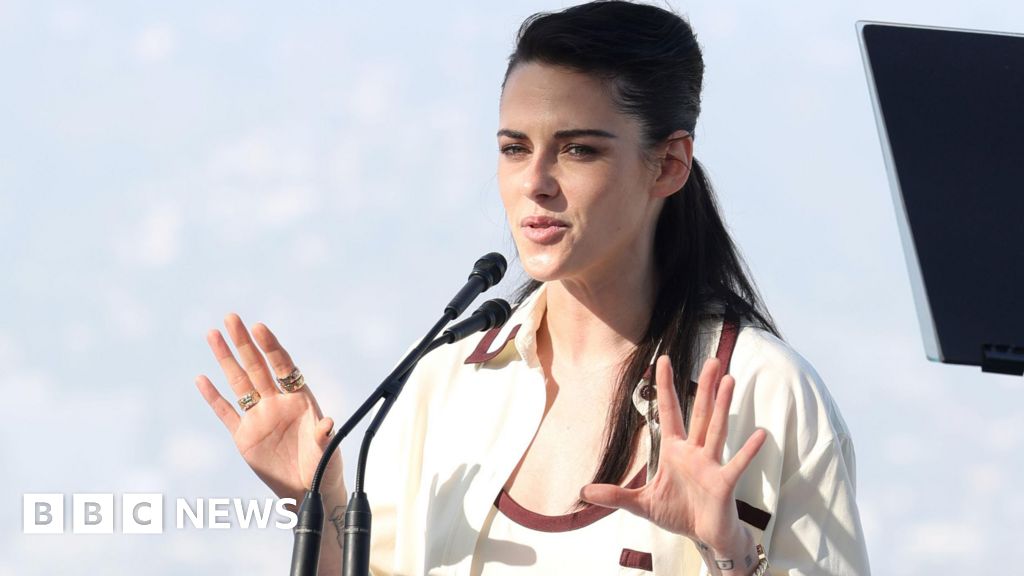Kristen Stewart 'so angry Hollywood has gone backwards' for women

```html Kristen Stewart Voices Fury Over Perceived Regression for Women in Hollywood
Kristen Stewart has expressed her strong dissatisfaction with what she sees as a decline in opportunities and support for female filmmakers in Hollywood. The actress and director delivered a passionate speech at a recent luncheon hosted by the Academy of Motion Picture Arts and Sciences in Los Angeles, stating that the progress made in the wake of the #MeToo movement has been significantly undermined.
Statistical Backsliding Fuels Concerns
Stewart, known for her roles in films like Twilight and her directorial debut with the forthcoming "The Chronology of Water," highlighted the stark statistics illustrating the limited representation of women behind the camera. Referencing The Celluloid Ceiling report, she pointed out that only 11 of the top 100 grossing films of 2024 were directed by women, a decrease from 16 in 2020.
"The backsliding from a brief moment of progress is statistically devastating," Stewart said. "Such a pitiful number of films from the past year have been made by women."
The Promise and Peril of the Post-MeToo Era
The #MeToo movement, which gained momentum in 2017, sparked a widespread reckoning regarding gender inequality and power dynamics within the entertainment industry. While 2018 saw a low of only four female directors in the top 100 films, the subsequent years showed a promising upward trend, peaking in 2020. However, Stewart and others fear that this progress has stalled, or even reversed.
"In a post-MeToo moment, it seemed possible that stories made by and for women were finally getting their due," Stewart stated. "That we might be allowed or even encouraged to express ourselves and our shared experiences, all of our experiences without filter."
She continued, describing the challenges she faces in getting her own stories told: "But I can now attest to the bare-knuckle brawling that it takes every step of the way when the content is too dark, too taboo, when the frankness with which it serves up observations about experiences routinely experienced by women, frequently provokes disgust and rejection."
Expert Analysis: A Shifting Landscape
Dr. Emily Carter, a professor of film studies at the University of Southern California, specializing in gender representation in media, offered her perspective on the issue. "The initial surge of female-led projects following #MeToo was undoubtedly significant, but it's crucial to understand that systemic change takes time and sustained effort," she explained. "The industry often responds to social movements with performative gestures, which can create a temporary illusion of progress. Maintaining momentum requires a fundamental shift in attitudes and practices, from funding decisions to distribution strategies."
Beyond Statistics: The Violence of Silencing
Stewart emphasized that the issue goes beyond quantifiable metrics like wage gaps. She spoke of the "violence of silencing," suggesting that women are often discouraged from expressing their anger and frustration about the inequalities they face. "It's like we're not even supposed to be angry," she said, before adding, "But I can eat this podium with a fork and [expletive] knife. I'm so angry."
Her impassioned words resonated with the audience, which included prominent actresses like Sarah Paulson, Julia Louis-Dreyfus, and Tessa Thompson.
A Call for Economic Empowerment
Stewart concluded her speech with a call for women to take control of their own economic resources within the industry. "I am not grateful to a boys' club business model that pretends to want to hang out with us while siphoning our resources and belittling our true perspectives. Let's try and not be tokenised. Let's start printing our own currency."
Historical Context: A Long Struggle for Representation
The fight for gender equality in Hollywood is a long and ongoing battle. From the early days of cinema, women have faced significant barriers to entry and advancement. While figures like Dorothy Arzner and Ida Lupino broke ground as directors in the studio era, their opportunities were often limited. The rise of independent cinema in the latter half of the 20th century offered more avenues for female filmmakers, but systemic biases persisted. The #MeToo movement brought renewed attention to these issues, but as Stewart's comments suggest, the industry still has a long way to go.
Looking Ahead: The Oscar Race and Beyond
With the upcoming Academy Awards season on the horizon, the spotlight is once again on the representation of women in film. While films from female directors like Chloé Zhao, Kathryn Bigelow, and Mona Fastvold are in contention, many observers expect the Best Director category to be dominated by male nominees once again. This underscores the continued challenges faced by women in achieving recognition at the highest levels of the industry.
Film critic and historian, Dr. James Olsen, commented: "The Oscars are often a reflection of the broader trends in the industry. While there has been increased awareness of the need for greater diversity and inclusion, the nomination process itself can be subject to biases and ingrained preferences. Ultimately, achieving lasting change requires a commitment from all stakeholders, from studios and producers to critics and audiences." ```
Originally sourced from: BBC Entertainment
